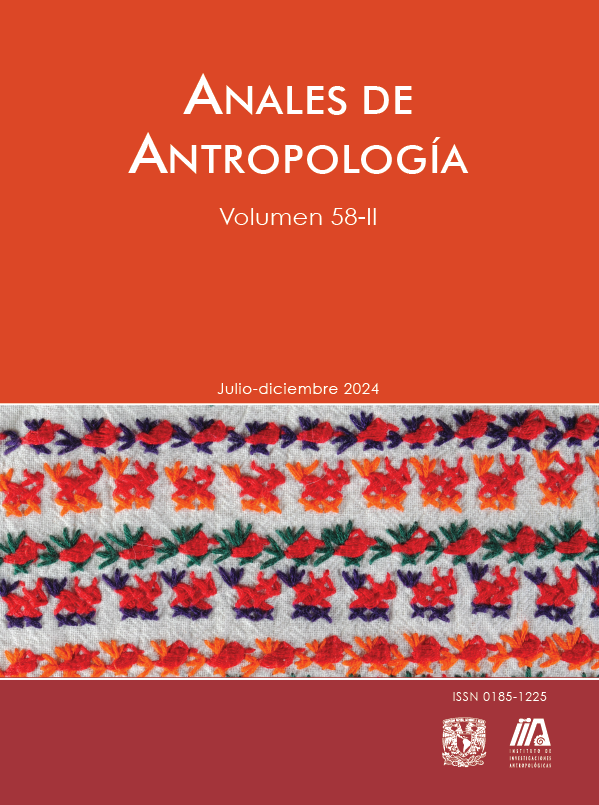Cockfighting. Games and Analogies in Anthropology
Main Article Content
Abstract
The objective of this article is to present a review of Clifford Geertz’s proposal for the analysis of cockfighting. During my fieldwork in the Sierra Mazateca (Oaxaca, Mexico) I was able to witness cockfighting tournaments in the patron saint festivities. Through a comparative exercise between my observations and Clifford Geertz’s descriptions, I will try to indicate some keys to discuss the conclusions of his famous essay. My argument is that Geertz’s text should be valued in the discipline, not only for its contributions to symbolic anthropology and its methodological proposal, but also for its contributions to the analysis of games. However, the analogy with the text does not seem appropriate to me either for the analysis of cockfights or for describing the objective of the anthropological discipline. Instead, I prefer the analogy with game –understood in a broad sense– as it allows us to resolve some of the objections that have been raised against interpretive anthropology.
Downloads
Article Details
Citas en Dimensions Service
References
Bazin, J. (2008). Interpréter ou décrire. Des clous dans la Joconde. L’anthropologie autrement (pp. 345-490). Toulouse: Editions Anacharsis.
Bateson, G. (1955). A theory of play and fantasy: a report on theoretical aspects of the project for study of the role of paradoxes of abstraction in communication. Psychiatric Research Reports of the American Psychiatric Association, 2: 39-51.
Bourdieu, P. (1980). Le sens pratique. París: Éditions de Minuit, Collection le sens commun.
Bourdieu, P. (2019). Curso de sociología general 1. Conceptos fundamentales. Collège de France, 1981-1983. Buenos Aires: Siglo XXI editores.
Caillois, R. (1957). Unity of play: Diversity of games. Diogène, 5 (19): 92-121.
Carles, P. (2001). La sociologie est un sport de combat, C-P Productions et VF Films. Película documental. Francia. 2h 26min.
Casajus, D. (2022). Le hasard mode d’emploi. Divination, arithmétique et machines littéraires. París: Éditions de l’EHESS.
Clifford, J. (1991). Sobre la autoridad etnográfica. C. Geertz y J. Clifford (eds.), El surgimiento de la antropología posmoderna (pp. 141-170). Barcelona: Gedisa.
Davis, J. M. (2013). Cockfight Nationalism: Blood Sport and the Moral Politics of American Empire and Nation Building. American Quarterly, 65 (3): September 2013, 549-574. DOI: 10.1353/aq.2013.0035
Esquerre, A. (2017). Le jeu et le hors-jeu. Les Temps Modernes, 696: 101-130. https://doi.org/10.3917/ltm.696.0101
Geertz, C. (1973). The Interpretation of Cultures. Nueva York: Basic Books.
Geertz, C. (1997). Juego profundo: notas sobre la riña de gallos en Bali. La interpretación de las culturas (pp. 339-372). Barcelona: Editorial Gedisa.
Geertz, C. (1983). Blurred genres: The refiguration of social thought. Local knowledge. Further essays in interpretative anthropology (pp. 19-35). Estados
Unidos: Basic Books.
González, A. (2010). El corrido: expresión popular y tradicional de la balada hispánica. Olivar (online), 12 (15): 11-36.
Hamayon, R. (2012). Jouer. Une étude antropologique à partir d'exemples sibériens. París: La Découverte. Coll. "Bibilothèque du Mauss".
Hicks, D. (2006). Blood, violence, and gender alignment: cockfighting and kickfighting in east Timor. The Cambridge Journal of Anthropology, 26 (3): 1-20. Disponible en https://www.jstor.org/stable/23820901 [Consulta: enero de 2024].
Huizinga, J. (1972). Homo ludens. (E. Imaz, Trad.). Madrid: Alianza editorial. 269 pp.
Instituto Nacional de Estadística, Geografía e Informática (INEGI) (2020). Localidad de Huautla de Jiménez. Censo de Población y vivienda 2020. México: Instituto Nacional de Estadística, Geografía e Informática.
Kessing, R. (1987). Anthropology as Interpretive Quest. Current Anthropology, 28 (2): 161-176.
Lévi Strauss, C. (1964). El pensamiento salvaje. México: Fondo de Cultura Económica.
Marvin, G. (1984). The Cockfight in Andalusia, Spain: Images of the Truly Male. Anthropological Quarterly, 57 (2): 60-70. Disponible en http://www.jstor.org/stable/3317580 [Consulta: enero de 2024].
Nivón E. y A. M. Rosas (1991). Para interpretar a Clifford Geertz. Símbolos y metáforas en el análisis de las culturas. Alteridades, 1 (1): 40-49.
Roseberry, W. (1982). Balinese Cockfights and the Seduction of Anthropology. Social Research, 49 (4): 1013-1028.
Rulfo, J. (1980). El gallo de oro. México: Ediciones Era.
Trémon, A. C. (2006). Combats de coqs et relations interéthniques à Raiatea (Polynésie française). Ethnographiques.org, 11 (octubre 2006): 1-50. Disponible en https://www.ethnographiques.org/2006/Tremon [Consulta: enero de 2024].
Weber, M. (2014). La superación de la concepción materialista de la historia: Crítica a Stammler. Madrid: Gedisa.
Wittgenstein, L. (1968). Los cuadernos azul y marrón (F. García Guillen, Trad.). Madrid: Editorial Tecnos.

This work is licensed under a Creative Commons Attribution-NonCommercial-NoDerivatives 3.0 Unported License.
Esta revista usa una licencia CC del tipo CC BY-NC-ND 3.0. Se maneja bajo el esquema de acceso abierto, con una licencia Creative Commons Attribution-NonCommercial-NoDerivs 3.0 Unported.
